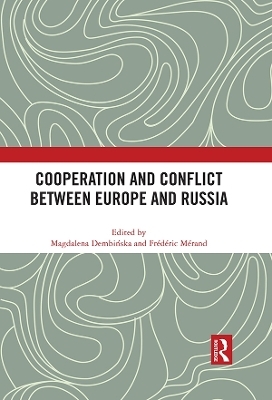
Cooperation and Conflict between Europe and Russia
Routledge (Verlag)
978-1-032-06440-6 (ISBN)
When thinking about relations between Europe and Russia, International Relations scholars focus on why conflict has replaced cooperation. The "geostrategic debate" excludes the possible coexistence of cooperation and conflict. Tracking the evolution of conflict and cooperation patterns in three zones of contact (Estonia, Kaliningrad, and Moldova) between 1991 and 2016, this edited volume argues that, although the standard narrative remains compelling, local patterns of cooperation and conflict are partly autonomous from the geostrategic level. To account for the coexistence of cooperation and conflict, the first chapter elaborates a theoretical proposition distinguishing fluid, rigid, and disputed symbolic boundaries, which have different impacts on the ground. The subsequent chapters address distinct dimensions of Euro-Russian relations, paying attention to local reality in Estonia, Moldova, Ukraine, or Kaliningrad, different sectors from energy to peoples’ movement, and across institutional contexts such as the EU and NATO. They confirm that the standard narrative holds in most cases, but also that Euro-Russian relations vary in crucial ways according to the interests and representations of actors immersed in specific geopolitical fields.
Despite a deterioration of geostrategic relations between Europe and Russia since the end of the Soviet Union, Cooperation and Conflict between Europe and Russia explores the intriguing coexistence of conflict and cooperation at the local level and across sectors and institutions.
The chapters in this book were originally published as a special issue of the journal East European Politics.
Magdalena Dembińska is Professor of Political Science and Academic Director of CÉRIUM, the Centre for International Studies at Université de Montréal. Frédéric Mérand is Professor of Political Science and Scientific Director of CÉRIUM, the Centre for International Studies at Université de Montréal.
1. Theorising cooperation and conflict in Euro-Russian relations
Frédéric Mérand, Magdalena Dembińska and Dominika Kunertova
2. Conflict and cooperation between Europe and Russia: the autonomy of the local
Magdalena Dembińska, Frédéric Mérand and Anastasiya Shtaltovna
3. Hybrid geopolitics in EU-Russia relations: understanding the persistence of conflict and cooperation
Cristian Nitoiu and Florin Pasatoiu
4. Kaliningrad: a dual shift in cooperation and conflict
Anna-Sophie Maass
5. Not on speaking terms, but business as usual: the ambiguous coexistence of conflict and cooperation in EU–Russia relations
Tom Casier
6. Theorising conflict and cooperation in EU-Russia energy relations: ideas, identities and material factors in the Nord Stream 2 debate
Marco Siddi
7. Crisis response, path dependence, and the joint decision trap: the EU’s eastern and Russia policies after the Ukraine crisis
Joan DeBardeleben
| Erscheinungsdatum | 28.09.2023 |
|---|---|
| Verlagsort | London |
| Sprache | englisch |
| Maße | 174 x 246 mm |
| Gewicht | 453 g |
| Themenwelt | Sozialwissenschaften ► Politik / Verwaltung ► Europäische / Internationale Politik |
| ISBN-10 | 1-032-06440-4 / 1032064404 |
| ISBN-13 | 978-1-032-06440-6 / 9781032064406 |
| Zustand | Neuware |
| Haben Sie eine Frage zum Produkt? |
aus dem Bereich


